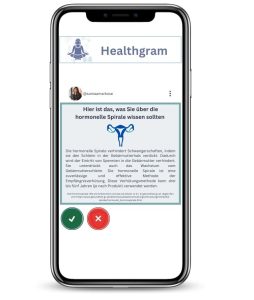A pilot study on factors influencing the credibility assessment of posts on social media on health topics among 18–24-year-old students
Aim and Research Question(s)
The aim of this pilot study was to investigate the influence of specific indicators on the credibility assessment of health-related information shared on social media among 18-to-24-year-old students. The research questions explored how German-speaking students perceived health-related content on social media with varying readability scores, content shared by celebrities or scientists, and the presence or absence of cited sources.
Background
The HLS19-AT survey conducted in Austria revealed that digital sources, including the Internet and social media, are primary channels for medical and health information [1]. This finding is supported by global research, including studies by Sumayyia et al [2]. The widespread availability of digital communication has led to an abundance of health-related content. While this presents opportunities, it also poses the risk of information overload and data fatigue [3]. To ensure individuals can make informed decisions, reliable information must be accessible and presented in a coherent manner [4]. Therefore, research focusing on the perception and impact of health-related social media content is crucial. By understanding how people engage with such content, valuable insights can inform the creation of effective health information.
Methods
A preliminary exploratory pilot study was conducted to examine the research questions. For the study, a website with ten fake social media posts was created and tested for usability. The posts were based on five different health-related topics. Each post included one or more of the three indicators that were explored: readability index, authorship, and source attribution. The survey participants were asked to do a credibility rating of the posts. The collected ratings were recorded, including the "likes" (perceived as credible), "dislikes" (perceived as not credible), and feedback. Subsequently, a score was calculated by assigning one point to each post rated as credible by the participants.
The collected ratings were recorded, including the "likes" (perceived as credible), "dislikes" (perceived as not credible), and feedback. Subsequently, a score was calculated by assigning one point to each post rated as credible by the participants.
Results and Discussion
32 people participated in the credibility ratings. The presence of a source, combined with a high readability index (post 9), resulted in the best credibility ratings. Whereas post 10 with the lower readability score and no source received the lowest credibility ratings. Participants in the survey focused on factors such as informative content, credible sources, well-structured presentation, appropriate images, and concise summarization.
Conclusion
The presence of sources or citations was mentioned as a key factor in rating posts as trustworthy, aligning with the literature on source credibility. Familiarity with the author or website influenced trustworthiness perception, but the literature warns against relying solely on familiarity. The results reveal that readability alone did not impact the participants’ credibility assessment. These findings emphasize the importance of considering multiple factors when evaluating the credibility of health information on social media.
References
[1] Gesundheitsziele Österreich - Für mehr Gesundheit in Österreich. (2022, February 14). Retrieved March 10, 2023 [2] Sumayyia, M. D., Al-Madaney, M. M., & Almousawi, F. H. (2019). Health information on social media. Saudi Medical Journal, 40(12), 1294–1298. [3] Naidoo, J., & Wills, J. M. (2013). Lehrbuch der Gesundheitsförderung. Prävention Und Gesundheitsförderung, 8(2), 117. [4] Kickbusch, I., Pelikan, J., Apfel, F., Tsouros, A. D., & WHO (Eds.). (2013). Health literacy: The solid facts.
